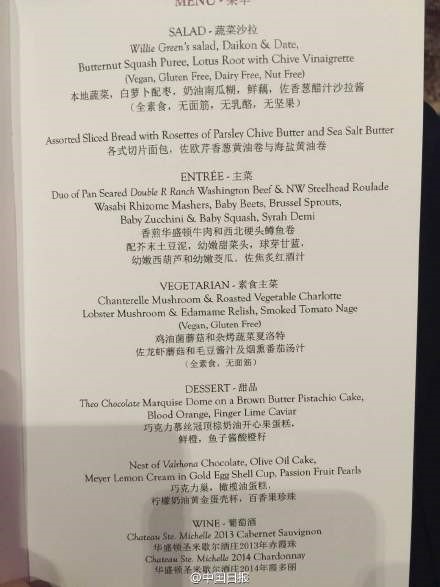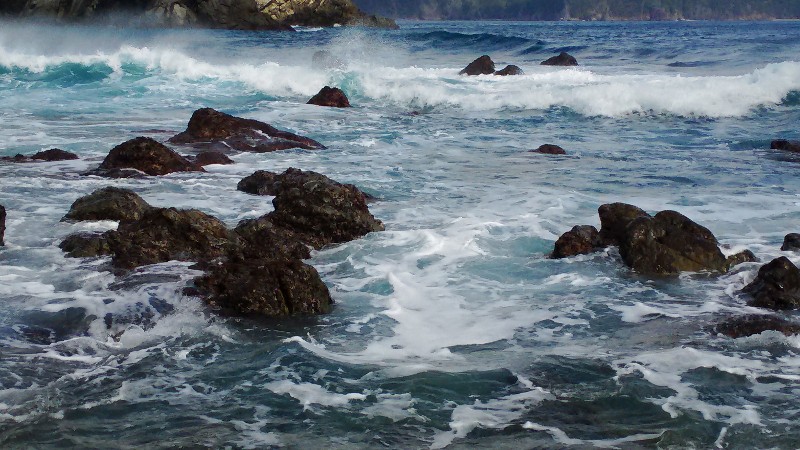メルマガから取って来た記事です。写真を見ると「MENU」の下に「SALAD-蔬菜沙垃」とあり、その下には「Daikon」(=大根、下に中国語で白萝卜”=bailuobo”とあります)。”white raddish”と英語で訳せるにも拘わらず。
「ENTRÉE-主菜」には「Wasabi Rhizome Mashers」(=配芥末土豆泥、マッシュドポテト山葵和え)で別に山葵で和えなくとも良さそうなものです。
「VEGETARIAN-素食主菜」の2行目には”Edamame Relish”(=毛豆(枝豆のこと)醤汁)とありますが、確かに” green soy beans relish”と言えば済むことです。
格安ワインを使ったのは習が中国で腐敗撲滅運動をしていて、いつも飲むワインが「長城” Great Wall”」ブランドのワインだからとありますが、賓客をもてなすのに2013、14年産のワインということはないでしょう。
アメリカに対抗していう事を聞かない習近平に対するささやかな意趣返しと言ったところでは。
アメリカも3125mの滑走路を造った南シナ海を傍観していると、中国は防空識別圏を設定してきます。自由な航行は出来なくなるでしょう。「力による現状変更は許さない」といくら口先で言ったって、中国が止めるはずがありません。力によるストップしか方法はありません。オバマはやはり無能です。
記事
http://qz.com/511126/syrian-refugees-once-had-lives-that-were-just-the-same-as-ours/
Last night (Tuesday, Sept. 22), China’s president Xi Jinping sat down for a banquet at the Westin Seattle hotel, where he delivered a policy speech.
The meal was not a formal state dinner and US president Barack Obama was not present, but it was a significant diplomatic event. And as always in diplomacy, the tiniest details matter. So when a picture of the menu served up for Xi emerged, a couple of items raised eyebrows.
Perhaps most controversial was the prominent use of wasabi, an ingredient almost synonymous with Japanese cuisine. Something of a surprise, given China’s testy relationship with Japan. A couple of other ingredients on the menu were written using their Japanese name, when alternative names exist.
If the organizers were aiming for maximum sensitivity, they could have swapped out “daikon” for the generic “white radish,” given that the root is not exclusive to Japan or Japanese cuisine. As an added bonus, the Chinese name for the root, bailuobo, also translates as “white radish” (the Japanese name daikon translates as “big root”). It’s trickier to find a well-known generic name for edamame, but “green soy bean” could have sufficed in a pinch.
And then there’s the wine. For red, there was a 2013 cabernet sauvignon from the Washington winery Chateau Ste. Michelle; for white, there was the 2014 chardonnay from the same winery. Both are no doubt fine wines, but at $15 per bottle and $11.95 per bottle respectively, it would be fair to say that even the same winery would likely have had more prestigious options available.
Or perhaps the organizers were aware of Xi’s recent campaign against excessive government spending, and didn’t want to embarrass the president by allowing him be seen drinking expensive wine. After all, even at home and during major events, president Xi is officially on China’s reasonably-priced Great Wall wine—as this menu for a meal immediately after China’s celebration of the 70th anniversary of the end of World War Two shows (link in Chinese).

